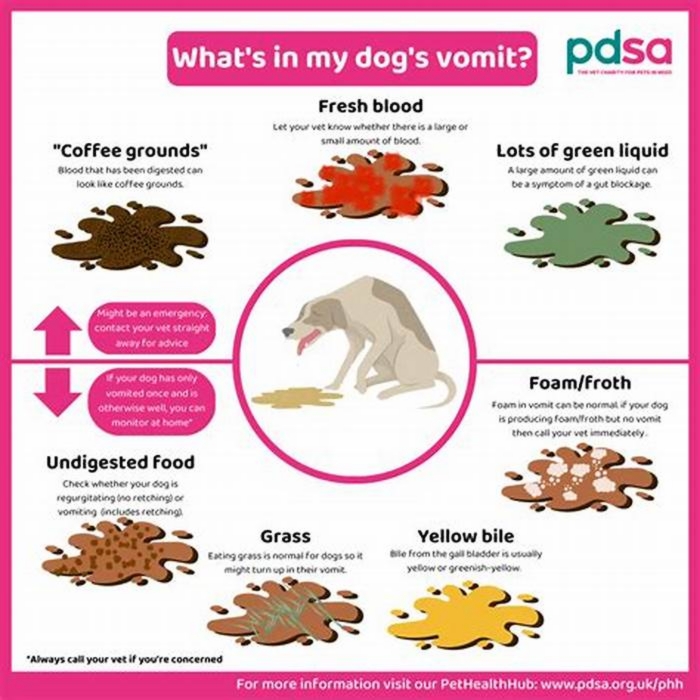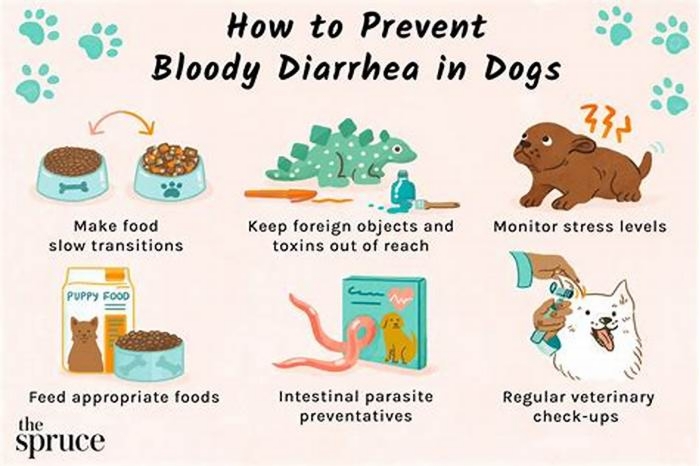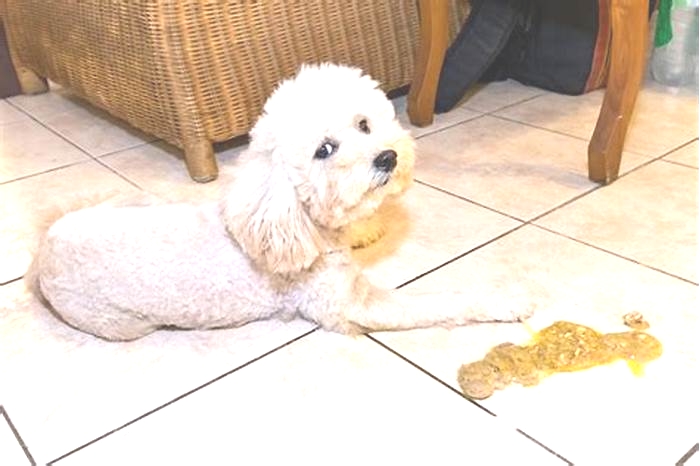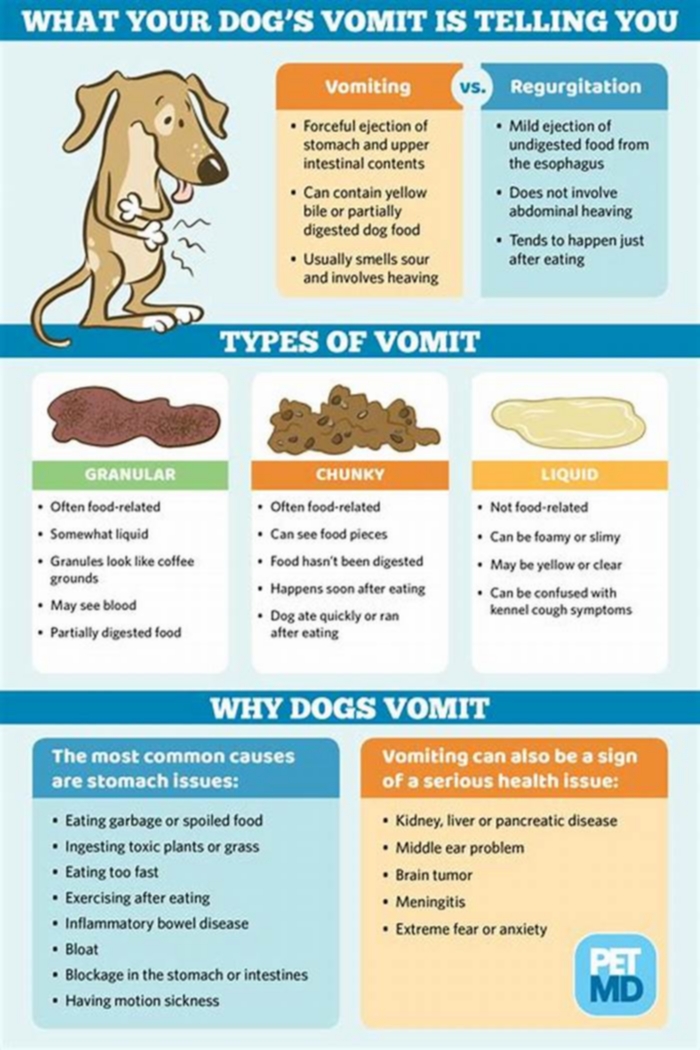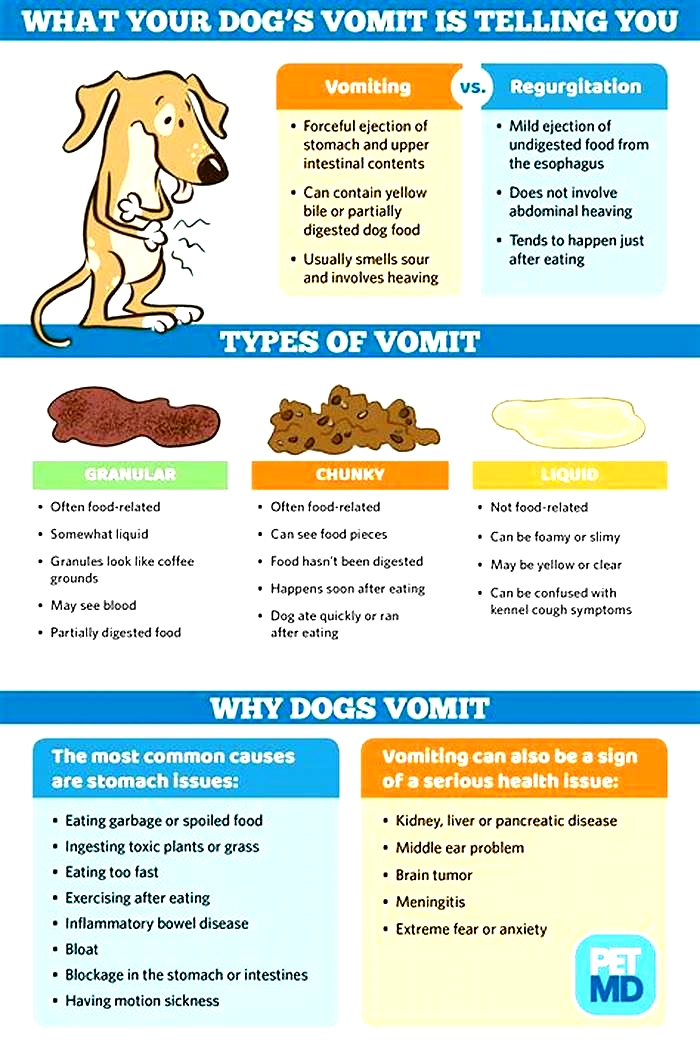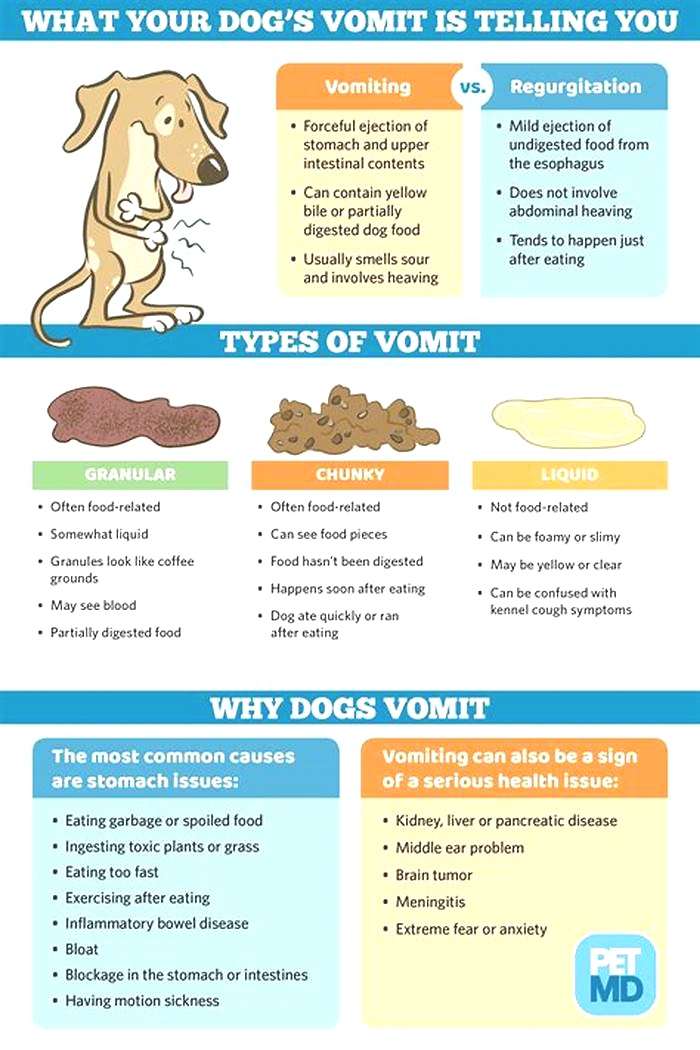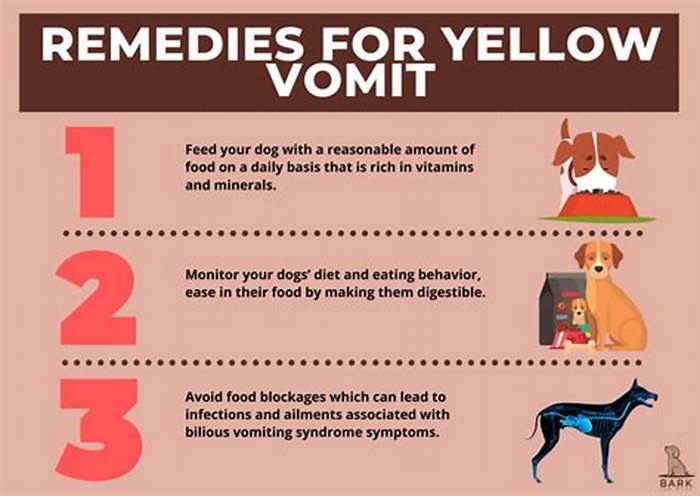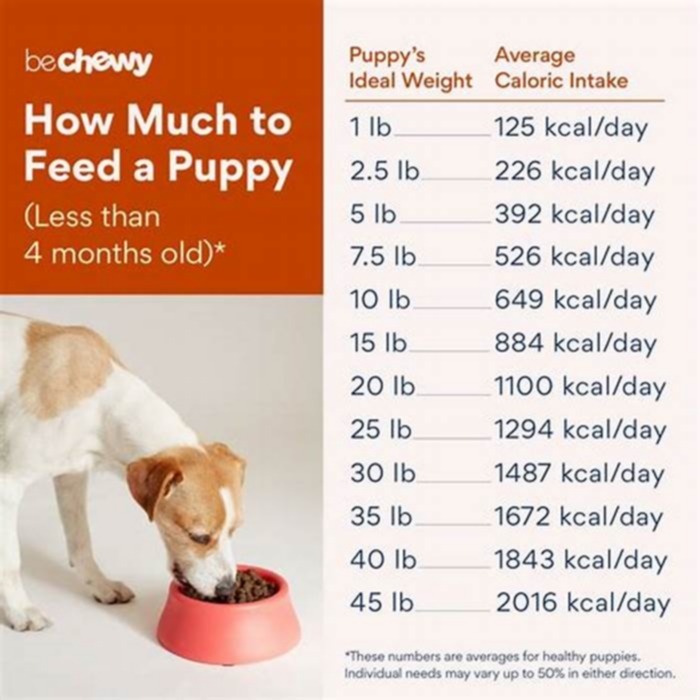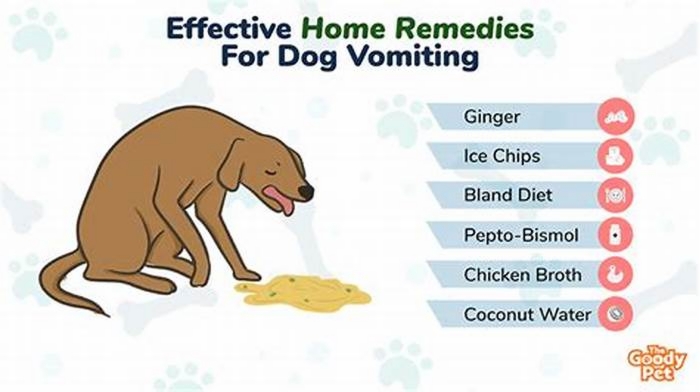dog vomiting when to worry
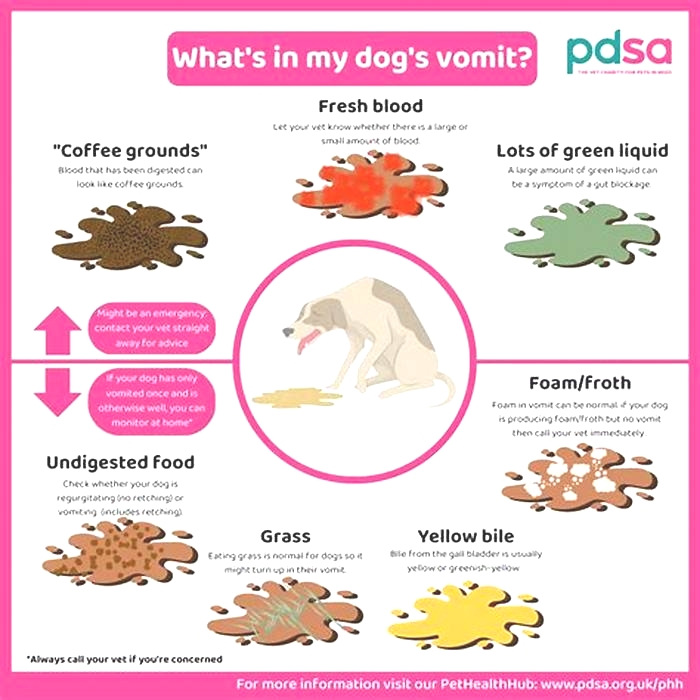
Dog Vomiting Causes & Treatment When Dogs Throw Up
If your dog is regurgitating the food, anything they bring up will appear undigested and may be shaped like a tube (the shape of the oesophagus). It also tends to reappear fairly shortly after the meal. This is not as serious as vomiting.
Why is your dog vomiting? 15 possible causes for dog vomiting
There are many different reasons why your dog may be vomiting. This can be caused by intolerance to new food or by ingesting something they shouldnt have. Keep in mind that the reason your dog is sick can also be more serious: heatstroke or kidney failure are possible causes too.
Some of the most common reasons why your dog is throwing up are:
- Dietary indiscretion also known as scavenging or eating something they shouldnt have done! This is the most common cause of vomiting in dogs
- A sudden change in diet or a potential food intolerance or allergy
- Intestinal dog parasites worms including: roundworms, heartworms, tapeworms, hookworms and whipworms. There will usually be a very heavy worm burden, however, before it causes vomiting
- Ingestion of foreign bodies these may include toys, sticks or bones
- Car sickness and motion sickness
- Dog heatstroke most often caused by leaving a dog in a hot car
- Reaction to medication or anaesthetic
- Viral infection such as rotavirus
- Bacterial infection including leptospirosis, colibacillosis and salmonellosis
- Dog kidney failure or liver failure
- Ingestion of something thats toxic or poisonous to dogs
- Pancreatitis inflammation of the pancreas
- Bloat most commonly caused by eating too fast or overeating
- Gastrointestinal disease such as Inflammatory Bowel Disease
- Other underlying diseases or metabolic conditions
Why is my puppy vomiting?
Your puppy might be vomiting due to stress, a new food, or food sensitivities. More seriously, they might have eaten something toxic or foreign, in which case they will need to see a vet immediately. This is especially true if vomit often and/or if theres blood in their vomit.
Like in older dogs, they could also be regurgitating from eating food too fast. Puppies can be very excitable - especially at meal times! It might be a good idea to get a slow feeder dog bowl for your puppy to help reduce the risk of regurgitation. Make sure to also see our guide on feeding puppies for more information.
Dog vomiting: when you need to worry
If your dog keeps throwing up more than once in 24 hours, or you notice that your dog keeps vomiting frequently or continuously and there are other unusual signs pointing to pain, discomfort, or a loss of appetite, you should get in touch with the vet.
Make sure you also contact them if your dog keeps throwing up for more than 24 hours.
If your dog is sick as a one-off randomly and shows no other symptoms of being unwell, then theres usually no reason to worry.
When your dog is showing any of the following signs, then its time to call your vet:
- If you think theyve ingested a foreign body or something poisonous
- You spot blood in their stools or vomit
- They seem to be vomiting frequently
- Theyre continuously retching unproductively (i.e. there is nothing coming up)
- Your dog seems to be in pain or discomfort
- Theyre demonstrating signs of depression and lethargy
- Theyre dehydrated
- Your dog seems to be losing weight and have lost their appetite
- They have a temperature
- Your dogs having seizures too
If your dogs throwing up as well as showing any of the signs above, contact your vet immediately. This could indicate a more serious problem such as a gastrointestinal foreign body or obstruction, kidney or liver failure or even canine cancer. With these serious diseases the key is catching and treating it early, so always be on the lookout.
Diagnosing vomiting in dogs
At the vet, theyll examine your dog and take into account their age, any other clinical signs, current physical condition as well as their medical history to investigate further.
Dog vomiting: when to worry
Dogs throw up for many reasons, from eating something they shouldnt have to being host to a parasite or as a symptom of a serious disease. How can you know if your pet needs help, or if you should wait and see? Here are a few signs you should watch out for.
When dog vomit requires an emergency vet visit
If you notice any of the following symptoms, contact your veterinary clinic for an emergency visit, as your dog could require immediate assistance:
- Diarrhea or bloody stools
- Shaking after vomiting or becoming lethargic
- Vomiting blood (red or pink colour)
- Eating a foreign object or a toxic substance
- Trying to vomit but being unable to
- Refusing to eat or drink
- Enlarged abdomen
- Pre-existing medical condition
- Puppy or senior dog
If your dog vomits only once, but otherwise seems like their usual self and continues to eat and drink normally, it may be safe to simply keep an eye on their condition. If you are in any doubt, calling your veterinary clinic is always advisable.
Is it vomit or regurgitation?
Vomiting occurs when your dogs body forcefully expels the stomachs contents. The substance may contain partially digested food, can include bile or a coloured liquid and usually has a sour smell. Its typically preceded by heaving and unusual sounds.
Regurgitation is a sudden, milder ejection of digested or undigested food and should be no cause for immediate worry. It often takes place soon after your dog has eaten too much or too quickly, when getting overly excited soon after eating or because of a food intolerance. If multiple episodes occur, your dog should be examined by a veterinarian
What the colour of your dogs vomit can tell you
The appearance of your dogs vomit can provide clues as to whats happening.
- Red or pink dog vomit could indicate bleeding into the stomach or intestine caused by an ulcer, a tumour, a foreign object or other conditions that requires urgent medical assistance.
- Yellow dog vomit usually takes place on an empty stomach. Bile secretions give the vomit this colour.
- A clear, liquid vomit usually contains mostly water, and may occur when your dog drinks too soon after being sick. Provide your dog with a smaller quantity of water more often, increasing the amount until they recover.
- Green vomit may be seen if your dog has eaten grass, possibly as an attempt to appease an upset stomach. Alternatively, green vomit may also be seen with more serious conditions, such as a foreign body obstruction.
Does your dog suffer from acute or chronic vomiting?
Acute vomiting takes place over a short period of time with no warning and no prior episodes. It could be triggered by anything from eating spoiled food or drinking contaminated water, by a contagious disease such as parvovirus or by a parasite. Contact your veterinary clinic if your dog shows any of the additional symptoms listed above, or vomits more than once in a day.
Chronic vomiting is vomiting that has been going on for a longer time. It may be intermittent with symptoms that come and go, such as a dog that vomits every few days or few weeks. Further investigation is needed to determine its cause and treat the condition. It could be food intolerance, a parasite, pancreatitis, inflammatory bowel disease or a stomach ulcer, among other things.
Dog vomit and diarrhea: a dangerous mix
Vomiting and diarrhea both cause dehydration. When they occur simultaneously, your dog may become dehydrated very quickly, leading to severe complications. Carefully monitor your dogs water intake, and contact your veterinary clinic if your dog has trouble keeping water down, is urinating less or seems lethargic.
Dog Vomiting
Caring for a dog who has vomited
If your dog has only vomited once and seems otherwise well, you may decide to wait and see if they vomit again before taking them to the vets. Here are a few things you can try at home during that time.
Starve them for a short amount of time
A short period without food (12 - 24 hours) can sometimes help but make sure they are still drinking water.
Give them small, regular bland meals
Give your dog small, regular, bland meals throughout the day. Bland diets are available in tins (contact your vet for more information), or alternatively you can give them plain boiled rice with chicken breast, white fish or low-fat cottage cheese. Dont give your dog anything rich or fatty this could make things much worse! Once your dog has stopped vomiting you can slowly start to re-introduce their normal food again.
Make sure they drink plenty of water
To prevent dehydration your dog will need to drink more than usual to replace what theyve lost in their vomit. Provide plenty of fresh water and make sure your dog is drinking little and often throughout the day. Speak to your vet if you are worried about the amount your dog is drinking.
Let them rest
While your dog is feeling poorly, its unlikely that they will want to do anything energetic so its a good idea to let them rest and recover for a couple of days.

